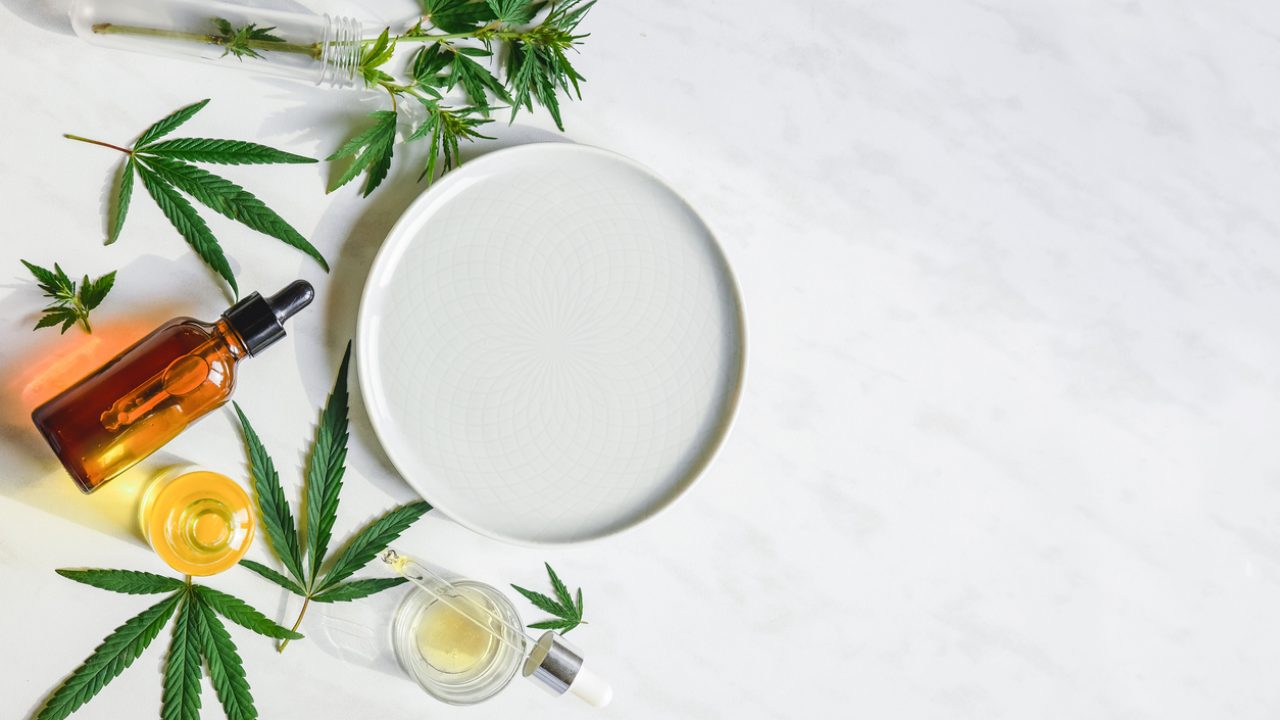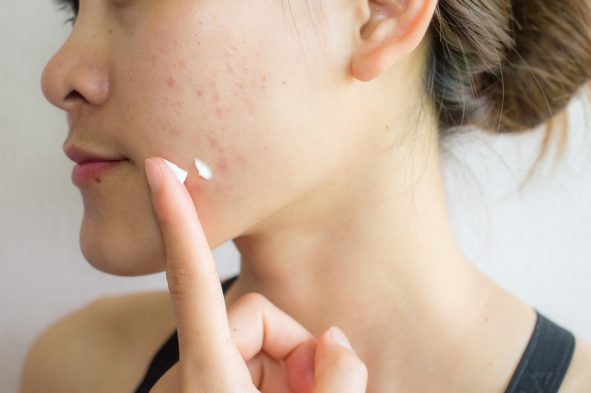
CBD – the widely-used acronym for Cannabidiol – is one of 113 chemicals known as cannabinoids found in cannabis.
In recent months, it’s become a hugely popular wonder drug, reportedly used to treat everything from period pains to anxiety, and acne. It’s even been described as the latest in anti-ageing “cures”.
So much so a report at the end of 2021 found that the number of Britons using CBD products rose 7% from 7.8 million to 8.4 million last year. With the majority claiming they use it to combat problems with pain, sleep, and mood. What’s more, one in five are taking it to support immune health.
If you’ve been near a beauty or skincare counter or shopped for makeup online recently, chances are you’ve seen the initials CBD cropping up in moisturisers, face masks and more but there appears to be a fair bit of confusion about what it is, how it’s used and why people are raving about it.
In our latest science-led explainer below, we will hopefully shed some light on this beauty trend.
We’ve previously explained the difference between vegan and cruelty-free products, why clean beauty is so popular, the science of moisturisers and what ingredients to look for when buying foundation.
CBD stands for cannabidiol and is a chemical that comes from a plant called Cannabis sativa, of which there are many strains including marijuana, hemp, Sativa and Indica.
It’s one of the 113 so-called cannabinoids found in these plants and is non-toxic. It’s typically extracted from hemp, which has a higher concentration of cannabidiol than the other strains. Plus, the use of hemp is not restricted in the UK, unlike other strains of the plant.
A study published in 2019, in the journal Cannabis and Cannabinoid Research concludes that CBD influences both our innate (natural) and adaptive (learnt) immune responses through a number of mechanisms, including
Since March, all CBD products are now classified as ‘novel food’ and regulated by the Food Standards Agency.
This is a question that comes up a lot because CBD originates from cannabis. However, it does not make you high.
It’s the compound tetrahydrocannabinol (THC) found in marijuana that gets you high because THC is psychoactive, meaning it alters brain function and causes temporary changes in your mood and behaviour, whereas cannabidiol is not.
Strains of the cannabis plant with high THC are more ‘potent’, and this is why they remain controlled in countries like the UK.
To break this down further, CBD doesn’t directly interact with the body’s endocannabinoid system (ECS), which receives signals from cannabinoids, according to a study from 2015. Instead, CBD works to enhance the effects of the body’s natural endocannabinoids.
For example, CBD stops the absorption of anandamide, a compound associated with regulating pain, meaning CBD can help some people with chronic illnesses.
When it comes to beauty and wellbeing, CBD oil has a number of uses and the most common reasons noted in recent research from CBD marketplace, Alphagreen were:
 Getty Images/iStockphoto
Getty Images/iStockphoto When used on the skin, CBD oil can help soothe inflammatory conditions like acne.
Alongside its anti-inflammatory properties, CBD works for acne by removing excess sebum, the oil produced by our skin that causes oily skin or greasy hair. Its calming properties mean it is great for people with red, reactive or sensitive skin.
FURTHER READING: What causes acne and how to get rid of it
CBD oil is also used, both alone and in other products, for its anti-ageing properties. It contains an antioxidant that bonds with free radicals to prevent them from causing DNA damage, according to Samir Juneja, founder of CBD of London.
“We know that skin ageing and inflammation go hand in hand, and CBD helps to combat oxidative stress,” she said.
FURTHER READING: How to prevent wrinkles, according to the experts – and why your phone may be making you look old
When CBD oil is consumed, usually via a couple of drops placed under the tongue, it has been reported to work as a mood enhancer, helping to soothe stress or anxiety. It is also marketed as a way to help people sleep.
A case study published in 2019, looking at 103 patients with anxiety or trouble sleeping, found after the first month 79.2 per cent reported decreased anxiety and 66.7 per cent slept better. It is important to note this is a small study, and the clinical evidence for CBD reducing anxiety or improving sleep is limited.
According to Alphagreen’s CBD in the UK: All You Need to Know report, one in seven (14%) people who buy CBD use it to relieve anxiety and stress and more than a third (37%) said they felt calmer after using it. One in seven (15%) said they were less irritable and 13% reported an improvement in their mental health and ability to get things done.
“There has been a lot of research into the use of CBD for anxiety, and good evidence of benefits,” said Dr Leon Barron, GP and tutor at UCL Medical School. “We also have some clear pointers to the mode of action — CBD has been shown to interact with several receptors which regulate fear and anxiety-related behaviours, including serotonin receptors.”
Indeed, a double-blind placebo trial in the Journal of Psychopharmacology involved patients with social anxiety disorder. It reported significant benefits and showed that CBD has a direct impact on the limbic and paralimbic areas of the brain — which are involved in processing our emotions and behavioural responses. Additionally, in 2015, a study by the University of New York Medical School concluded: “CBD has considerable potential as a treatment for multiple anxiety disorders.”
CBD oil can also be used as targeted pain relief.
OHNE, a company that makes organic tampons, sells 1 per cent CBD oil to help treat period cramps. The company suggests rubbing the oil on your belly or lower back when needed or putting some into a bubble bath. For a 10ml bottle, OHNE’s ‘holy cramp’ costs £27. But for something you use a few drops of every month, it might be worth it.
Dr Attam Singh, Clinical Associate at the London Pain Clinic, added: “Cannabis receptors are widely distributed throughout the brain and body, so it’s not surprising that CBD has a broad spectrum of health and wellness benefits.”
Due to the process involved in making CBD powder, and the fact it’s proving so popular, CBD oil is not cheap, generally speaking.
CBD is first extracted in powder form from whichever plant is being used via what’s known as CO2 extraction. This is a method commonly used to extract oils from botanicals. It involves subjecting it to high pressures using carbon dioxide, separating out any waxes, cannabinoids and other compounds it contains, then collecting each separately.
It can come in the form of capsules, serums, moisturisers, face masks, soaps and pillow sprays but one of its more popular forms is created when the powder is mixed with oils, like coconut, olive or hemp oil, to make different variations of CBD oil.
Don’t confuse CBD oil with hemp oil, which is produced by pressing the hemp plant and contains little CBD. If you want to be certain, you can check a product’s ingredients list for cannabidiol.
In shops like Holland & Barrett, you can pick up a 10ml bottle of 2.75 per cent CBD oil for £20.
Brands like Milk Makeup sell different products containing CBD, like lip balm and face masks.
Alphagreen sells a huge range of various CBD products and is the leading CBD marketplace in Europe.
Disciple Skincare sells a 30ml bottle for £45, and its CBD oil is a ‘full spectrum’ oil, meaning it contains everything found in the hemp plant, including cannabinoids like cannabigerol (CBG) and trace amounts of THC.
The alternatives to this are ‘CBD isolate’, meaning the powder has been added to oil with no other cannabinoids in it, and ‘broad spectrum’, which means the THC level is below 0.3 per cent.
You can also get CBD as a food supplement, in the form of Dragonfly CBD, which can read more about in our guide to overnight hair treatments and how to get better sleep.

Abigail is a leading science journalist writing about space, sustainability, technology and culture. She is author of The Art of Urban Astronomy, a must-have guide to the night sky that guides you through the seasons and learn about the brightest stars and constellations, the myths and legends of astronomy and how to identify star clusters and galaxies.
